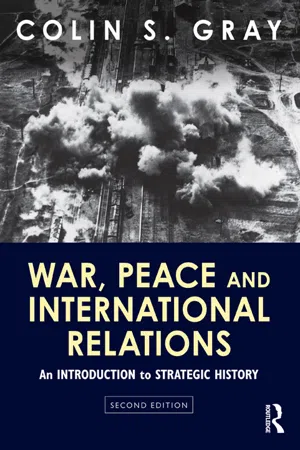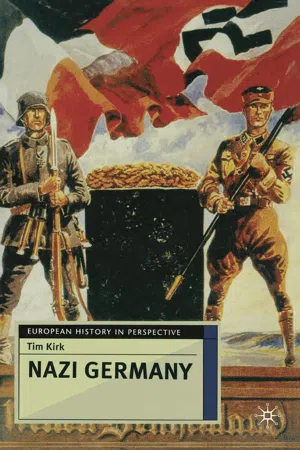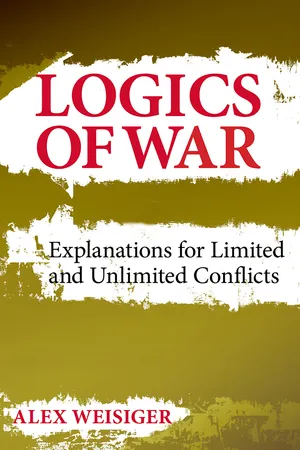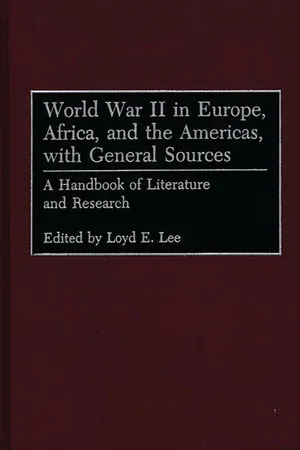History
Germany in WW2
Germany played a central role in World War II, led by Adolf Hitler and the Nazi Party. The country's aggressive expansionist policies led to the invasion of Poland in 1939, sparking the war. Germany's military campaigns, including the Blitzkrieg tactics, and the Holocaust, where millions of Jews and others were systematically murdered, are defining aspects of this period.
Written by Perlego with AI-assistance
Related key terms
1 of 5
6 Key excerpts on "Germany in WW2"
- eBook - ePub
War, Peace and International Relations
An introduction to strategic history
- Colin S. Gray(Author)
- 2013(Publication Date)
- Routledge(Publisher)
11 World War II in Europe, II
Understanding the warReader's guide: Hitler's purpose and role in the war. How the war was waged. Reasons for Germany's defeat. The war and themes in strategic history.Introduction: what was the war about?
When delving into the rich contextuality and contingency of events, there is a risk that somewhere amid the detail and the complexities the essential historical plot is obscured or even lost. The origins, causes, enabling conditions and triggering occurrences that generated World War II attract a host of expert scholars, and rightly so. But, ultimately, the necessary and sufficient explanation for the outbreak and general course of the war could hardly be more straightforward. After 30 January 1933, Germany was led – one can hardly say governed, since Adolf Hitler did very little personal governing – by a man who needed to wage war in order to realize his vision of a racially pure Greater Germany occupying territory that was suitably expansive for a burgeoning populace of Aryan settlers. That land was in the East, held by Slavs, so it would have to be seized by force. In order to take this land and construct a strategically secure (blockade-proof) Germanic continental fortress, Hitler needed to abolish the European balance of power and replace it with German imperial hegemony. Exactly how and when this visionary purpose could be achieved were as uncertain in detail as its pursuit was to be unswervingly steady. Hitler intended to achieve world domination via the successful conduct of a series of wars, and he expected that process to be completed by 1950. Alone among the great powers of the 1930s, Germany had a leader who knew what he wanted and what he would, and would not, accept. He could be flexible, rationally prudent at times, and even temporarily deterred when opportunities faded. However, he could not be deflected from pursuit of his vision of a Europe dominated – or, more accurately, owned – by a new Nazi German Reich. - eBook - PDF
- Tim Kirk(Author)
- 2006(Publication Date)
- Red Globe Press(Publisher)
Chapter 9: Foreign Policy and the Second World War Foreign policy, war and territorial expansion were absolutely central to Nazism as a political movement. Its ideological roots were in the radical nationalist milieu of the late nineteenth century, while the NSDAP itself grew out of war and defeat. The early Nazi Party was one of a number of right-wing paramilitary groups that recruited demobilised soldiers, among them Hitler himself, and it profited as a political party from the widespread indignation prompted by the peace settlement – and this was a feeling shared by millions of Germans, by no means all of them Nazis, or even nationalists. The Third Reich existed for barely 12 years and for half of that time it was engaged in an aggressive expansionist war. Even during its 6 years of peace, the reality of everyday experience in Nazi Germany was shaped by preparations for war, and by the economic dislocations that resulted from the headlong drive for rearmament. The combination of rearmament boom. Hitler’s apparent success in restoring Germany’s international greatness and the military victories of the early war years all did much to reinforce the stability of the regime and the authority of its leadership. Conversely, the removal of the dictatorship came only with total military defeat. Defeat, revolution and the mythology of betrayal shaped the political climate in which the Nazi Party was established, and determined the course of politics throughout the Weimar Republic. The German people had been assured of victory by their military and political leaders, and when defeat eventually came it was such a shock that many people, espe- cially on the nationalist right, refused to accept it, constructing for them- selves the reassuring fiction that German’s armies had not been militarily defeated but had been betrayed at home by Bolshevik revolutionaries 195 - eBook - ePub
Narratives of War
Remembering and Chronicling Battle in Twentieth-Century Europe
- Nanci Adler, Remco Ensel, Michael Wintle, Nanci Adler, Remco Ensel, Michael Wintle(Authors)
- 2019(Publication Date)
- Routledge(Publisher)
narratives they composed to explore the origins, history and consequences of World War II, depended to a significant degree on the biographical and political context from which they emerged. Often, the individual perspective corresponded quite literally with their personal circumstances and whereabouts during the last weeks of the war. The reasons why historians choose a certain field of study and political alignment are rather complex, but the specific front experiences across Nazi-occupied Europe, imprisonment by Allied or Soviet forces and survival of the air war in the shelters of Berlin in a certain sense foreshadowed a later orientation towards the liberal reconstruction in the West or the socialist experiment in the East.The history of historiography should concern itself with the many contexts that shape historical writing. In doing so, it has to offer much more than a Nabelschau of an overly self-conscious profession or a mere documentation of historiographical ‘progress’. As the case of World War II historiography in post-war Germany illustrates, the two dominant narratives of triumph and defeat, and their social resonance and relevance, depended heavily on the way individual historians mastered their lives within broader, often extremely violent collective ‘realms of experience’, as Reinhardt Koselleck termed it. As mutually influential echoes of a shared past, these narratives offer a distinct vantage point from which to write an ‘integrated’55 history of post-war Germany – a war-torn, fractured yet entwined cultural landscape of which historians were not the least intriguing inhabitants.Notes
1 See his programmatic text, A. Hillgruber, ‘Politische Geschichte in moderner Sicht’, Historische Zeitschrift , 1973, vol. 216, 529–52.2 E. Jäckel, ‘Vom Kampf des Urteils gegen das Vorurteil: Andreas Hillgruber zu Ehren’, in J. Dülffer, B. Martin and G. Wollstein (eds.), Deutschland in Europa: Kontinuität und Bruch: Gedenkschrift für Andreas Hillgruber zu seinem 65. Geburtstag - eBook - ePub
Visiting the Normandy Invasion Beaches and Battlefields
A Helpful Guide Book for Groups and Individuals
- Gareth Hughes(Author)
- 2016(Publication Date)
- Pen & Sword Military(Publisher)
The Second World War – A Very Brief History
Causes
In the West, in the decades following the end of the Second World War, the conventional explanation for the outbreak of the conflict has largely settled upon that of an evil Nazi regime, led by a deranged racist bile-spewing lunatic, exploiting the weak Allied policy of appeasement in order to unleash a global conflict that: a) would overturn the terms of the harsh Treaty of Versailles and b) expand and entrench an ethnically pure Third Reich1 across Europe.Although it is far beyond the remit of this book to critically examine this, it is important that we consider a little more perspective and context so that we may better understand the complex set of events and ideas that led to this war. To place the full explanation on the motives of the Third Reich runs the risk of viewing history through the lens of what we now know rather than the reality of the situation as it actually unfolded. The causes of this war were many and complex. They were deeply rooted yet simultaneously reactionary and involved numerous competing world views and the power of the forces of history.The First World War
Before considering the epoch-shattering 1914–1918 cataclysm it is worth going back to the formation of Germany itself and the defining 1870–1871 Franco-Prussian War. Following the defeat of France, the new German state, finally proclaimed on 18 January 1871, could define itself as a nation forged out of conflict and subsequent victory, walking with the strutting confidence of the Prussian military class, who dominated the political make-up of the new nation.The Balance of Power in Europe was a concept crucial for nineteenth century statesmen; simply, no one power should be allowed to dominate the continent and keeping a relative peace was built upon this crucial doctrine. In truth, following the defeat of Napoleon, it was the British who had a vested interest in maintaining this – the emergence of a newly powerful, growing rival was not good news for London. - eBook - ePub
Logics of War
Explanations for Limited and Unlimited Conflicts
- Alex Weisiger(Author)
- 2013(Publication Date)
- Cornell University Press(Publisher)
[4] World War II G ERMAN E XPANSION AND A LLIED R ESPONSE In contrast to the Paraguayan War and to many other bloody wars from history, which historians have often described as unnecessary and tragic, World War II seems less puzzling: Adolf Hitler did it. While ancillary questions remain, such as why the German people were willing to rally to Hitler’s standard, the man himself has been seen as history’s ultimate outlier, and World War II as simply the extension of his unique personality. It is likely for this reason, for example, that international relations scholars have spent far more time examining World War I, which is frequently seen as unnecessary and hence puzzling, than World War II. A serious attempt at explaining variation in the duration and severity of wars cannot afford, however, to simply paper over an extreme case as an unexplainable outlier, however attractive that approach may seem. It is thus worth asking to what extent the theory advanced here can account for German foreign policy prior to and during World War II. Indeed, I argue that the preventive war mechanism provides an excellent account of Hitler’s decisions. In this case, there are two separate components to Hitler’s fear of decline. First, and more important, Hitler operated according to a clear and consistent ideology that informed him that absent significant territorial expansion Germany was headed for long-term decline. This belief thus was the basis for the Lebensraum policy and the conclusion that an expansionist war was in Germany’s interest. Second, given that prior conclusion, Hitler then calculated that the late 1930s would be the optimal time to undertake that expansion, as rapid German rearmament and internal disorder in the Soviet Union had given Germany a temporary advantage that would not be sustainable in the long run - eBook - PDF
World War II in Europe, Africa, and the Americas, with General Sources
A Handbook of Literature and Research
- Loyd Lee(Author)
- 1997(Publication Date)
- Greenwood(Publisher)
Clearly, in matters of race the war made a difference, whether seen as a culmination of Nazi social policies or viewed as the opportunity or cir- cumstances for racial radicalization. Burleigh and Wippermann, The Racial State, comprehensively survey Nazi race policies (see also their bibliogra- phy) for Jews as well as Roma (Gypsies), the mentally handicapped, aso- cials, and homosexuals, with an emphasis on policy and institutions. This literature is very extensive and is often classified under the topic of the Holocaust. For homosexuals, see Plant’s The Pink Triangle, titled after the ‘‘badge’’ homosexuals were required to wear in the concentration camps. The first chapters of Diefendorf’s In the Wake of War dramatically detail bomb damage and its immediate consequences. The trauma of defeat and occupation in 1945 is treated in Peterson, The Many Faces of Defeat. An American army interpreter and interrogator between 1945 and 1947, Pe- terson culled memoirs and diaries, official archives, and private papers and conducted interviews to build a multifaceted account of the great variety of experiences in immediate postwar Germany. RESISTANCE The history of the German resistance is more a part of that country’s coming to terms with its own past than of a commonality with other Eu- ropean resistance movements that fought against German occupation and rule as well as sometimes against national socialism. Also unlike occupied countries, resistance to the regime bore the stigma of treason to one’s The Domestic Impact on Germany 403 country, a main reason interest in the German opposition was slow to develop and still remains ambiguous. Where it existed (and its depth re- mains disputed), it was more consciously a political and moral act than a struggle against foreign oppression. Some scholars prefer the term ‘‘op- position’’ to ‘‘resistance,’’ though the two words are often used inter- changeably. Other differences suggest the distinctiveness of German resistance.
Index pages curate the most relevant extracts from our library of academic textbooks. They’ve been created using an in-house natural language model (NLM), each adding context and meaning to key research topics.





